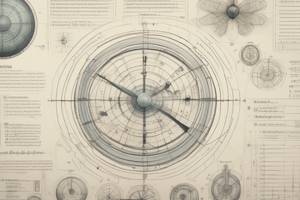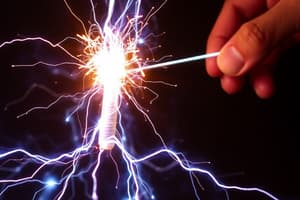Podcast
Questions and Answers
Which unit of measurement is commonly used to measure the mass of powdered gold in local markets?
Which unit of measurement is commonly used to measure the mass of powdered gold in local markets?
- Cubit
- Weqet (correct)
- Digit
- Pace
What is the primary purpose of using hand-span, cubit, and digit in the classroom activity?
What is the primary purpose of using hand-span, cubit, and digit in the classroom activity?
- To measure the lengths of objects (correct)
- To measure the temperature of surroundings
- To measure the area of surfaces
- To measure the weight of objects
What are students asked to do with their measurements of the desk or table?
What are students asked to do with their measurements of the desk or table?
- Record in a table (correct)
- Create a visual presentation
- Convert into mass units
- Compare with standardized measurements
Which aspect of mass measurement is specifically mentioned as being part of indigenous practices in Ethiopia?
Which aspect of mass measurement is specifically mentioned as being part of indigenous practices in Ethiopia?
What might cause students to have different measurements for the same object?
What might cause students to have different measurements for the same object?
During the comparative exercise, what should students write in order?
During the comparative exercise, what should students write in order?
Which indigenous measurement is NOT mentioned for measuring length in the activity?
Which indigenous measurement is NOT mentioned for measuring length in the activity?
What should students justify after measuring the table or desk?
What should students justify after measuring the table or desk?
Which of the following is correctly paired with its measurement type?
Which of the following is correctly paired with its measurement type?
Which measurement unit is typically larger than both digit and cubit?
Which measurement unit is typically larger than both digit and cubit?
Flashcards are hidden until you start studying
Study Notes
Basics of Scientific Investigation
- Unit covers scientific measurements and conducting investigations.
- Learning outcomes include identifying units of measurement and components of scientific investigations.
Scientific Measurements
- Measurement is determining the magnitude of a quantity relative to a standard.
- Indigenous methods are locally practiced, while modern methods align with the scientific community.
Indigenous Methods of Measurement
- Traditional methods have been passed down through generations.
- Length is measured using indigenous units, including:
- Hand-span: Distance from the tip of the little finger to the tip of the thumb.
- Digit: Width of an adult male fingertip.
- Cubit: Distance from the elbow to the middle finger tip.
- Foot: Measure from the heel to the big toe.
- Pace: Distance of one walking step, measured from heel to heel.
- Arm Span: Distance from fingertip of one hand to the other when arms are fully extended.
Mass Measurements
- Mass is the amount of matter in a substance.
- Indigenous unit for measuring mass in Ethiopia is the Weqet, used primarily for weighing gold powder.
Investigation Components
- Importance of scientific investigation includes following procedures and ethical issues.
- Simple investigations can be conducted using locally available materials.
Measurement Concepts
- Distinction between basic and derived units of measurement.
- Basic units include length, mass, time, temperature, volume, area, density, and force.
- Accuracy refers to how close measurements are to the true value; precision indicates the consistency of repeated measurements.
Activities and Exercises
- Group activity for measuring the width of a table using hand-span, cubit, and digit.
- Exercise on comparing sizes of different indigenous length units for understanding variations in measurement.
Additional Notes
- Understanding and practicing these measurements fosters collaboration and respect in scientific endeavors.
- Conversions among various measurement units enhance measurement accuracy and comprehension.
Studying That Suits You
Use AI to generate personalized quizzes and flashcards to suit your learning preferences.






